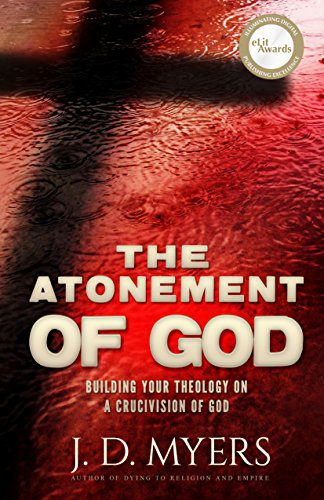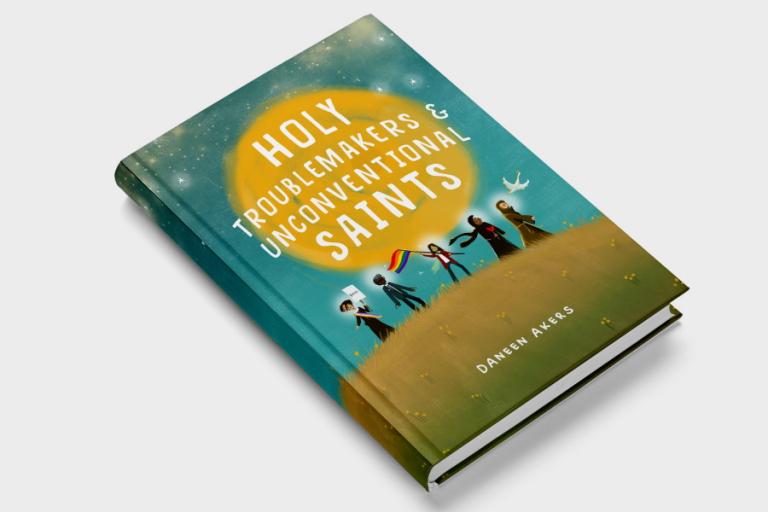I’ve long enjoyed discussions and debates with my friend Jeremy Myers on his blog and on Facebook. He’s played a big part in my own journey, and I’m thrilled to share his latest book with you now.
In The Atonement of God, Jeremy examines what it means that Jesus died for our sins. Many different theories attempt to explain how Jesus’ death secured our salvation, but as Jeremy shows, they can mostly be divided into either violent or non-violent views of the atonement. Using the cross as the center of his interpretation, Jeremy dismantles the notion that God ever uses violence to achieve his purposes.
Jeremy has agreed to discuss his book with me as an interview you can all enjoy.
Chuck: Jeremy, I loved reading The Atonement of God. Thank you for what you’ve written and for taking the time to chat about it now. The non-violent understanding of God you discuss is so important for the church to grasp today. What first led you to rethink the more-common violent picture of God?
Jeremy: Every theological idea I have originates somehow with my wife. She is not a writer or what one might call a “theologian,” but she knows the heart of God better than anyone else I have ever met.
A couple decades ago, before we were even married, I remember going with her on walk near where she lived in Wheaton, and on this walk she gently asked some challenging questions about the character of God and His violent behavior in the Bible. She was not so sure that the typical way of reading these texts was correct.
I, of course, being the professionally trained theologian that I was, set her straight with many fine-sounding arguments about inspiration, inerrancy, the evilness of sin, and the holy sovereignty of God. My arguments were so persuasive that now, twenty years later, I have come to see that she was right all along.
My discomfort with the violent portions of Scripture really came to a head when I myself became a “chaplain to the empire,” and I saw how those in power used God to justify their own violent ways. I began to think that maybe, just maybe, this is what was actually going on in Scripture as well.
This book is the result of some of my thinking along these lines.
Chuck: Such thinking has massive implications for our theology. You describe this in your book using the term “crucivision.” That’s a great word! Did you come up with it? Or if not, where did you come across it? For those who have not yet read your book, could you offer a definition for crucivision theology?
Jeremy: Yes, it is a word I coined. I had been reading and hearing words like “cruciform” and “Christotelic” in some of my studies for this book, and while I don’t mind those words, they didn’t quite describe what I wanted to say.
Crucivision theology is the idea that we can best see everything through the crucifixion of Jesus. The crucifixion of Jesus gives us the proper vision, or perspective, by which to see and understand God, ourselves, human history, Scripture, sin, forgiveness, and a whole host of other topics. All of Part 2 of the book shows 10 areas of theology that are affected when viewed through the crucifixion of Jesus, thus giving us “crucivision theology.”
Chuck: You mentioned our understanding of scripture, and this an area that I’ve been spending a lot of time on lately. Quite a few passages depict God as either commanding or committing violence. Readers will obviously need to get your book for a full explanation of your view here (and I understand you’ll soon release another book specifically on this topic?), but could you give a brief overview of how you interpret violent passages according to crucivision theology?
Jeremy: The Atonement of God is little more than an introduction to some of the areas of theology that are affected by the crucifixion of Jesus. It does not deal with the vast majority of the troublesome texts in the Bible that you refer to. I do have a book in the works that will take a closer look at each of these troublesome texts individually, but that book is rapidly turning into a whole series of books, and I am not quite sure what to do about that…
But the basic approach to all the violent texts will be similar to what I have outlined in this book. If you take any violent event in today’s world, whether it is a war, a disease, or a natural disaster, and listen to how people explain why these violent events occur, you will see that some people always lay the blame for such things at the feet of God.
We go to war in God’s name against His enemies because they are so evil. He sent the disease on those people because of their numerous sins. That disaster fell upon them over there because they were so wicked and rebellious.
People often point to the Bible as the justification for thinking such things, for there are similar sorts of explanations found in the Bible for wars, diseases, and disasters. And yet, there is an often overlooked and ignored subcurrent within Scripture which hints that, while God took the blame for all these things, God didn’t really have anything to do them. Just like today, people in biblical times blamed God when bad things happened or when they did bad things in God’s name.
I try to explain in my book that the real revelation of Scripture is not that God actually does these horrible things, but that we humans do them or cause them, and we then blame God for them. We turn God into the ultimate scapegoat.
This thesis is supported by the supreme revelation of all things in Jesus Christ on the cross. The greatest crime ever committed is carried out on the cross, and wouldn’t you know it, God gets blamed for it!
When we see how they killed Jesus in God’s name, we can then begin to see that just because violence is carried out in the name of God, this does not mean that God is actually behind it.
The religious-political violence of the crucifixion leads us to see all the religious-political violence of history and Scripture in a new light. What happened on the cross has happened since the very first violence of human history, and it has been happening up until now.
Chuck: I love this interpretation. I think it’s such a great way to frame things. But I have to be honest, while your book specifies that this allows you to affirm inerrancy, I have a hard time seeing that. I love your paradigm for interpreting these passages, but I’m not sure I understand how it gets the biblical authors off the hook for saying things about God that weren’t true—i.e., errors. Any thoughts on that? Could you also comment on why you believe it’s important to maintain inerrancy?
Jeremy: Let me answer the second part first. I sometimes think I hold to inerrancy simply because I’m stubborn. But thankfully, my wife still holds to inerrancy, so I guess I’m on the right track. Ha! Seriously though, it seems to me that the greatest truths and insights from Scripture come from the hardest to understand places. The largest gems are found under the hardest rock. When people do not hold to inerrancy, they tend to just pass over the hard texts and the difficult texts of Scripture as being hopelessly in error. To me, stamping a difficult text with the “error” label is not only too easy to do, but also risks missing out on whatever jewel of truth is hidden within that hard soil. I hold to inerrancy to force me to dig and study and think and pray as hard as I possibly can for as long as I possibly can about each and every text in Scripture.
So what about the passages of Scripture where the people are saying things about God or doing things in the name of God that really had nothing to do with God? How are those not errors?
Maybe it would be best to think not in terms of truth or error, but in terms of true revelation and false revelation. I can say that the entire Bible is a true revelation, an inerrant revelation, even when it contains things that are not true about God. How? Because even things that are not true about God are still inerrant revelations about something else.
In other words, there are lots of statements in the Bible about God that are not true about God. But recognizing this fact actually makes such statements the greatest truthful revelations of all, for it is only in recognizing the error of someone else that we can then see this same error in ourselves, and then move toward the truth as it is revealed in Jesus Christ.
Let me give an example. In the book of Job, three friends try to comfort Job with their theological opinions. Nearly everybody today agrees that their theology about God is false. What Job’s three friends say about God is an error. (I sort of suspect that Job himself was wrong as well, as the closing chapters of the book reveal, but that idea will have to wait for my future book). Yet although they are wrong about God, their theological ideas are still found within the inspired and inerrant Bible. Why did God inspire false ideas about Himself to be inerrantly recorded in Scripture? Because so many people around the world and throughout time (including in our own day) believe these false things about God!
The theology of Job’s three friends is the popular-level theology of most people. God put it in Scripture to show us how wrong it is so that we might correct and change our own theology.
This is exactly why these other wrong ideas about God are also included in Scripture. God included them to show us the bad theology that is in the hearts of most people, so that we might see it and correct it in our own hearts.
Some of the truest and greatest revelations in Scripture are found when it reveals our own hearts to us. This happens most in those portions of the Bible where people are doing horrible things in the name of God and blaming God for the most horrible of crimes. Why is this inerrant revelation? Because we all do the same things today, and we need to stop it! The Bible reveals these things to us, not to justify similar behavior today, but to reveal our own hearts to us so that we stop such behavior.
Chuck: We won’t touch on everything your book covers here, but I do want to bring up one more specific area of theology that you address: sin. A lot of Christians treat sin as if God just forbids things because he finds them personally offensive. Some folks go so far as to say that God can’t even be in the presence of sin. How can crucivision theology help our understanding here?
Jeremy: The issue of sin is where I hope to touch people the most through this book, and through much of the other things I write. People are so burdened by sin, and most of this burden has nothing whatsoever to do with Scripture or the heart of God, but everything to do with the power and control of manipulative religion.
If I could accomplish one thing in all my writing, it would be to liberate people from the fear and shame brought on by the religious view of sin.
I want people to know that God loves them more than they could ever possibly imagine. That no matter what they have said or done, God is not offended, upset, or angry. He feels only love and forgiveness. The incarnation of Jesus proves without a shadow of a doubt the way God feels about humans trapped in sin. And the crucifixion and resurrection of Jesus shows what God has been doing about sin since the world began.
Look, God does desire that we not sin. There are numerous and frequent commands and instructions in Scripture for us to stop sinning. But the reason is vitally important. God doesn’t want us to stop sinning so that He can love us and be near us. God will never leave us or forsake us no matter what. No, the reason God wants us to stop sinning is because sin hurts us. God loves us so much that He does not want to see us get hurt, and so he warns us about those things that will hurt us.
I want everybody who reads this book (or my blog) to realize that God does not punish us for sin. Sin does not separate us from God. God is not angry about sin. He has always forgiven all people for all their sin. You are forgiven, no matter what. You are loved, no matter what. Jesus promises it, and the crucifixion proves it.
Chuck: There’s so much more that that this affects, and you cover a lot of ground in your book. But if readers were to take away only one thing from The Atonement of God, what would you have that be?
Jeremy: I probably just stated it.
I want people to know they are loved.
That is such a cliché, though, I don’t think people really understand what it means.
The last line of the book says, “May there come a day when Christians too are known for our love.”
The goal of the book is not just to help people know that they are loved, but to help us move from this knowledge to actually living out this love in our own lives and toward other people.
The book tries to explain it more by showing that God does not kill people because they are sinners. Nor does He send diseases or disasters. This means that God will never send such things upon you either, and He is not calling us to exact revenge on others.
God is not too concerned about your sin, except for the fact of how it hurts you. So don’t get too worked up about sin. Focusing on sin just leads to more sin. Instead, just remember how much God loves you. When you sin, just pick yourself up off the mat and move forward in the knowledge that you are loved and forgiven. When we see ourselves as loved in this way, we can then begin to extend similar love and forgiveness toward others.
Knowing this about God’s love for us will also lead us to living in loving ways toward all others, for just as God loves us, He also loves them, which means that we too can love them.
Ultimately, the love of God is the center of it all. This also makes love the litmus test for our theology and behavior.
Chuck: Amen! Thank you for the book, Jeremy, and thanks so much for the discussion! Any closing thoughts you’d like to add?
Jeremy: Yes, just one:
Chuck, I love your writing, your thoughts, and the direction you are going on your blog. You are an inspiration to me as well. Thank you for your friendship and email conversations over the years. I look forward to more such conversations in the future.
Chuck: I look forward to it as well.
Be sure to pick up your copy of The Atonement of God, as a paperback or a Kindle eBook.













